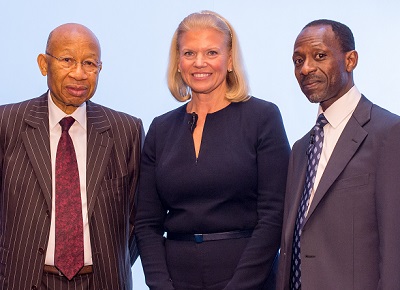E-Business
IBM Invests in Accelerating Innovation in Nigeria

IBM has announced it is further expanding its operations across Africa with the opening of an IBM Innovation Centre in Lagos, Nigeria.
The new facility is designed to accelerate innovation for Nigerian and West African business and IT skills.
Using the centre, clients, IT partners, developers, entrepreneurs, venture capitalists and academics can now access enhanced cloud capabilities and extensive big data and analytics resources.
Adoption of cloud technology in Africa has reached a tipping point and in Nigeria alone, cloud usage is expected to more than double to 80 percent of businesses in the next year.
In addition, the growing proliferation of mobile phones and tablets is accelerating the opportunity to interpret data patterns to anticipate needs and deliver improved services.
As the local demand for these types of technologies and skills increases, Africa is quickly moving to the center of global attention as the last big emerging market of the current economic era.
According to the IMF, Sub Saharan Africa is set to be the world’s second fastest growing region with projected economic growth of over six percent this year.*
To take advantage of this explosive growth, the new centre will focus on providing solutions that use Big Data & Analytics and cloud technologies to solve key local challenges such as improving government services, digitising banking services and enhancing customer centricity in telecommunications.
Clients will be able to participate in virtual and in-person training, test out new products, network with peers from around the world, and receive mentoring and guidance from IT and business experts.
For example, the centre will provide clients hands-on access to cloud-based industry solutions such as IBM Intelligent Operations designed to provide cities, governments and utilities with a central command center for the use of predictive analytics to enhance efficiency and manage all their operations.
“Our investment in this centre is in line with our strategy to help fuel growth in Nigeria’s IT sector and to support the use of advanced technology service delivery for the public sector and commercial business growth, particularly expansion in West Africa,” said Taiwo Otiti, IBM West Africa country general manager.
“IBM Innovation Centres are designed to help clients envisage their future, illustrated using IBM Social, Mobile, Analytics and Cloud solutions, combined with industry focused experience and expertise. Through this centre, we will bring the reach of IBM’s global capabilities and thought leadership closer to local and regional clients.”
IBM believes its new test and demonstration environment will serve to cut the costs and complexity of assessing IT solutions, but will also assist CIOs in presenting strong business cases for advanced technology adoption.
The company is already working with the Union for International Cancer Control (UICC) to create the world’s largest and most comprehensive clinical dataset on cancer patients by building cancer registries in developing nations, beginning in Sub-Saharan Africa.
“Innovation has become a key driver of positive change in developed economies, and IBM has blazed the trail once again in this market with its new Innovation centre,” said Mr Victor Hammond, managing director of Lagos-based Bankers Warehouse Ltd, a non-bank financial services institution and Nigeria’s leading cash management and cash-in-transit service provider.
“I foresee this facility becoming a key driver of technology innovation in Nigeria, helping to promote the culture of knowledge incubation and scientific enquiry in all sectors of the national economy.”
IBM has been operating in Africa since the 1930’s, and today has a direct presence in more than 20 African countries, including: Nigeria, Tanzania, Senegal, South Africa, Morocco, Egypt, Tunisia, Algeria, Ghana, Nigeria, Kenya, and Mauritius.
IBM plans to continue strengthening this network with more new facilities, offerings and partnerships in the next few years.
The new centre joins a worldwide network of over 41 other IBM Innovation Centers in 33 countries including South Africa and Kenya.
Through this network, IBM connects local companies and entrepreneurs with technical and industry experts around the world and can support growth with introductions into new markets.
E-Business
Nigeria Targeted with 4,622 Cyber-attacks Per Week in December 2025

In December 2025, organisations globally faced sustained cyber pressure, as the average number of cyber-attacks per organisation per week reached 2 027, a 1% increase from the previous month and a 9% increase from December 2024.

This is according to December 2025 Global Cyber Attack Statistics by Check Point Research, the threat intelligence arm of Check Point Software Technologies.
According to the statistics, Latin America was the hardest hit, with companies experiencing an average of 3 065 cyber-attacks per week, a 26% year-over-year increase.
In contrast, Africa saw a decline in attacks, with Nigeria (4 622 attacks per week) and Angola (4 002 attacks per week) being the most targeted countries on the continent.
The report’s findings highlight the evolving cyber threat landscape, with ransomware and GenAI-driven data risks posing significant challenges to companies worldwide.
Ransomware attacks jumped 60% year over year, with 945 publicly reported incidents in December. Qilin was the most active ransomware operator, responsible for 18% of publicly disclosed attacks.
“Ransomware continues to scale through industrialised operations, while unmanaged GenAI usage is creating widespread data exposure at enterprise level,” said Omer Dembinsky, data research manager at Check Point Research.
The report noted the education sector was the most targeted industry globally, with 4 349 cyber attacks per week; followed by government (2 666 attacks per week); and associations and non-profits (2 509 attacks per week).
The widespread adoption of GenAI tools has introduced new cyber security risks, with one in 27 GenAI prompts posing a high risk of sensitive data leakage.
Experts warn that companies must prioritise prevention-first security, real-time AI threat intelligence and strong governance over AI tools to mitigate these risks.
Hendrik de Bruin, head of security consulting at Check Point Software, added: “Strengthening ransomware resilience, deploying AI-powered prevention and enforcing clear GenAI governance will be critical to reducing cyber risk in the year ahead.”
E-Business
Half of Global Companies Build SOCs to Enhance Cybersecurity, with a Focus on Human Expertise

Among the primary reasons for establishing a Security Operations Center (SOC) are strengthening cybersecurity posture, enabling faster detection and response and gaining a competitive edge.

Interestingly, despite the increasing demand for automated cybersecurity solutions, businesses rely on skilled security professionals to make key decisions, as human expertise remains essential for effective security management.
A Security Operations Center (SOC) is a dedicated organisational unit responsible for continuous monitoring and safeguarding of a company’s IT infrastructure. Its core mission is to proactively detect, analyse and respond to cybersecurity threats.
To identify the main drivers, strategic priorities, and potential challenges in SOC planning and implementation, Kaspersky has conducted a comprehensive global study involving senior IT security specialists, managers and directors from companies with 500 or more employees.
All participants operate without a SOC but have plans to establish one in the near future. The study spans 16 countries across APAC, META, LATAM, Europe, and Russia, providing valuable insights into the emerging trends and best practices in SOC development worldwide.
The findings of the research reveal that 50% of companies intend to establish SOCs to strengthen their cybersecurity posture, and 45% are motivated by the need to address increasingly sophisticated and dangerous threats.
Other drivers include budget optimisation, the necessity for faster detection and response, and the expansion of software, endpoints and user devices – factors that demand more comprehensive and layered security measures.
These are cited by 41% of organisations. Additionally, 40% seek better protection of confidential information, 39% aim to meet regulatory requirements and one-third (33%) expect SOC capabilities to provide a competitive edge. Larger enterprises tend to cite each of these reasons more often, reflecting the broader operational and regulatory pressures they experience.
Continuous monitoring becomes the leading SOC requirement
Among the key functions organisations plan to delegate, 24/7 security monitoring leads at 54%. This around-the-clock vigilance enables early detection of anomalies, prevents escalation and sustains cyber resilience in real-time. This demand highlights a strategic requirement for proactive risk management, as organisations aim to defend against persistent threats that can strike at any moment.
Companies intending to fully outsource SOC operations show a stronger interest in applying “lessons learned” methodologies, whereas those developing internal SOCs focus more on access management to maintain tighter control.
Human expertise drives SOC technology choices
While SOCs use advanced technology, the choices made by organisations show that human analysts are very important. Among the solutions that organisations plan to include in SOC are – Threat Intelligence Platforms (48%), Endpoint Detection and Response (42%) and Security Information and Event Management systems (40%) – sophisticated solutions that automate data collection and reduce operational load, however, they depend heavily on skilled security professionals who provide critical context, interpret complex findings and make final decisions when guiding appropriate responses.
Other solutions chosen include Extended Detection and Response (38%), Network Detection and Response (37%) and Managed Detection and Response (33%). Large enterprises tend to adopt more technologies (5.5 per SOC on average), while smaller ones integrate fewer (3.8).
“To successfully build a SOC, companies must prioritise not only the right mix of technology but also the careful planning of processes, clear goal-setting and effective resource distribution.
“Well-defined workflows and continuous improvement are essential to ensure that human analysts can focus on critical tasks, making the SOC a proactive and adaptable component of their cybersecurity strategy,” comments Roman Nazarov, Head of SOC Consulting at Kaspersky.
E-Business
Nigerian Terra Industries Secures $11.8m for Expansion

Terra Industries, a Nigerian defence technology startup, has raised $11.75 million to expand its development of defensive systems that protect critical facilities across Africa.

The fundraising round was led by Silicon Valley venture firm 8VC, which was founded by Palantir co-founder Joe Lonsdale.
Other investors in the round include Valour Equity Partners, Lux Capital, SV Angel, and Nova Global, as well as African-focused funds Tofino Capital, Kaleo Ventures, and DFS Lab.
Terra Industries, founded in Abuja by Nathan Nwachuku and Maxwell Maduka, provides multi-domain security solutions for both air and land. Its solutions are intended to detect and respond to threats including terrorism, sabotage, and armed attacks on infrastructure.
The company’s product portfolio includes surveillance drones, ground-based robotic systems, and fixed monitoring towers deployed around sensitive locations.
Co-founder and CEO Nathan Nwachuku said the company has now fully embraced its identity as a defence-focused startup, citing the growing urgency of security challenges across Africa.
He said safeguarding critical infrastructure from terrorist threats has become unavoidable.
Nwachuku argues that protecting Africa’s infrastructure requires a different approach, one that combines local manufacturing, end-to-end system control, and software capable of independently identifying and responding to threats over large areas.
The company aims to position itself as a defence prime, similar to the role played by firms such as Anduril Industries and Palantir in the United States.
Nwachuku also disclosed that the company had earlier raised $800,000 in pre-seed funding.
With the new funding, Terra plans to increase manufacturing capacity within Africa, establish additional defence production facilities, and expand its artificial intelligence and software teams.
While software offices are planned for San Francisco and London, the company said manufacturing operations will remain on the continent.

 General News3 days ago
General News3 days agoPalmPay, Premier Cool to Reward 10,000 Nigerians with ₦100m in “10k for 10k Campaign”

 E-Financial3 days ago
E-Financial3 days agoEcobank Joins Trillion-naira Club for the First Time in 20 Years

 E-Business3 days ago
E-Business3 days agoKaspersky Warns Telecom Threats from 2025 will Carry into 2026 as New Technology Adds New Risk

 E-Financial2 days ago
E-Financial2 days agoAngst as FG Demands 7.5 Percent VAT on Mobile Bank Transfers, USSD

 E-Business3 days ago
E-Business3 days agoNigerian Terra Industries Secures $11.8m for Expansion

 Telecom3 days ago
Telecom3 days agoSHELT Named in Prestigious 2025 MSSP 250 List for Cybersecurity Excellence

 News2 days ago
News2 days agoMoniepoint Launches Second Cohort of DreamDevs Initiative to Double Down on Africa’s Tech Talent Pipeline

 E-Financial2 days ago
E-Financial2 days agoNGX lists 3.156bn UBA shares, boosting capital to N513Bn



























